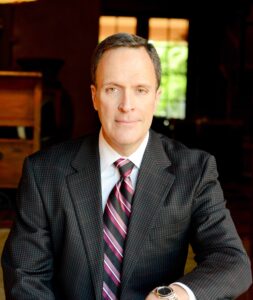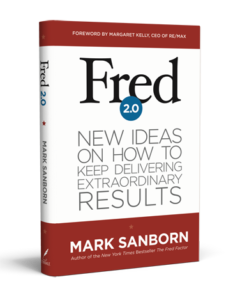He’s an international bestselling author of eight books who regularly tops the bestseller lists, a global leadership guru and one of the most in-demand speakers on the subjects of leadership, customer service and team building. His many awards include the Cavett Award, the highest award the National Speakers Association bestows on its members. He’s a member of the Speaker’s Roundtable.
As you’d expect from a world authority, his clients include the biggest corporations, names like Cisco, Costco, FedEx, Harley Davidson. Add the important alphabet companies like IBM, GM, KPMG, RE/MAX and ESPN.
Outside of all of that, Mark is one of the most decent people I’ve ever met. He’s smart, caring, and he passionately wants to serve others.
WHAT IS A FRED?
Nine years ago, Mark Sanborn invited us to meet his own postman, Fred Shea. Fred embodied true success by taking what seems to be an ordinary job and making it extraordinary. To this day, when I see someone who serves in an extraordinary way, I think, “There’s a Fred!” The Fred Factor became an international phenomenon, selling millions and millions of copies.
FRED RETURNS
This week, Fred returns in Fred 2.0: New Ideas on How to Keep Delivering Extraordinary Results. Last summer, I had the opportunity to get to know Mark. When he told me that Fred 2.0 was on the way, I couldn’t wait to learn more.
Mark, let’s start out with two questions many people ask you. Is Fred real? And, if he is, are you in touch with him? Maybe one more: Does he know he’s the star of this book?
Skip, Fred is very real and still delivering mail in Denver, CO. Over the years we’ve maintained a friendship and connect periodically for lunch or dinner. Fred is a big supporter of The Fred Factor and Fred 2.0, and in the new book I share—with his permission—much more about him, his background and his beliefs.
What is it about Fred that struck a chord with millions of people all over the world?
I think it is because Fred isn’t Bill Gates or Warren Buffett. Those two are so successful and have so much money that it is hard for the rest of us to relate to them. But Fred is just like us: He’s an ordinary person with a pretty ordinary job. What makes him different from many is that he’s chosen to do it in an extraordinary way, and it encourages us to realize that we can do the same.
There is so much material in this book that we can’t cover it all. I want to jump to one of your recommendations, “Cultivate your creativity.” I’m a student of innovation and creativity, but most of us don’t think of a postal worker and creativity in the same sentence. Yet you say that is one of the reasons Fred is set apart. How do you cultivate creativity in all jobs?
All creativity requires a little extra mental effort. The quicker you come up with a solution to a problem, the less likely it is the best solution. We often accept the expedient and easy over the creative and innovative.
What I think most people miss is that creativity is more fun than “business as usual.” When we challenge ourselves to be more creative, it makes our work more engaging and enjoyable.
One way any of us can become more creative is to look at our work—the things we do every day—and ask, “How can I add value to what I do?” What can you do better or differently that will be appreciated by your customer for the added value it creates? I think you need to replace money with imagination to find better ways to do your job.
And you don’t have to reinvent your entire job to be creative; sometimes it just takes a little change, a creative flourish, to distinguish yourself and the work you do.
You inspire many when you say, ”You can make a unique contribution.” The starting point is to identify what you call your “signature difference.” How do you discover your signature difference?
Start with what you are passionate about, and then add what is unique to you. One story I share is about a man also named Fred who loves growing roses. He’s become an incredible encourager and is world-class at saying thank you with the roses he grows in his garden. He doesn’t just write a thank you note—he sends thank you roses. And if someone is down and needs cheering up, Fred sends them roses. Fred has developed a signature difference.
One of your chapter titles is “Be A Head Fred.” I appreciated the opening line of that chapter: “The first job of leadership is to help people see their significance.” What advice do you have for leaders who want to make this a reality?
You have to pay attention. That sounds simple, but it isn’t easy. You need to study the gifts and contributions of those you lead, and then make sure they understand the difference they are making. You can’t use a cookie-cutter approach to leading. What’s required is the concerted effort to notice, know and understand those you lead. And don’t keep the information to yourself. The power is when you specifically acknowledge employees for what they’re doing.
Mark, you’ve had a window into boardrooms around the world whether as a board member yourself or as someone providing advice to the company. When you visit a team, how do you determine whether it is a high-performance team living the Fred principles or, on the opposite side of things, one heading for disaster?
One of the biggest clues (and perhaps most unusual) is energy. High performing teams are energized. They are purposeful and producing results, and you can sense their vigor. A lack of energy is a give-away that people are either demoralized or don’t care very much about the work they’re doing.
What are the most important characteristics of a leader?
There are many, but I’d start with integrity. I like to define integrity as the distance between your lips and your life. It is about being congruent between what you say and what you do and what you believe and how you behave.
Another key characteristic is connection. Great leaders are great relationship builders. You can’t fake being interested in others. Either you are or you aren’t. And when you demonstrate concern and care for others, that’s the basis for meaningful connection.
I’ve heard you say, “Leadership is always an outcome of behavior.” What behaviors can someone implement immediately to make a difference in leadership style?
Identify the kind of difference you want to make. It needs to be something important to you that is also important to those you serve, work with or live with. Leadership is about specifics, not generalities. When you are intentional about what you’re trying to change or improve, the added focus and energy will enable a bigger impact.
What are you reading? What books inspire you?
I read very broadly and have increased the time I spend on periodicals and the web because of the timeliness of the information I can get. I still read a lot of C.S. Lewis and G.K. Chesterton as the classic authors’ ideas are always valuable. They don’t change with the times. Over the years I’ve highlighted almost every book I’ve read, so I make it a point to go back and review one great book I’ve read each week. By focusing on the highlights I can quickly remind myself of the best ideas. The writing of Peggy Noonan inspires me. She writes from a very specific political point of view, but I get great insights and experience beautiful writing every time I read one of her columns or books. And I’d mention another of one of my favorite writers and speakers, Erwin McManus. Erwin is a pastor but also one of the most interesting and artistically creative people I’ve ever met.

